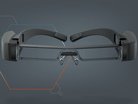Epson Smart Glasses Help Manufacturers Halt Downtime

Smart glasses in the mainstream take users to enhanced realities. We see this with Apple and Google’s smart glasses, which through their plethora of visually exciting content and platforms, augment the surrounding world. But what about smart glasses that remove all distractions, allowing you to focus on solving tasks like never before?
What about a pair of glasses that provides real-time feedback, allowing you to speak to an expert who can tell you exactly how to tackle a task to succeed? If this sounds too good to be true, think again. Because it’s an innovation that’s already shaping supply chain manufacturing, in a sleek black pair of frames.
Global technology manufacturer Epson is set to attend MAINTEC later this June, to showcase the company’s newest innovation in remote assistance- the Moverio industrial AR smart glasses. The manufacturing equivalent of the Apple AR glasses, the Moverio smart glasses provide step-by-step instructions and training for new employees, allowing for hands-free visual instruction. This is made possible by the glasses' Si-OLED micro display, which presents vivid colours and sharp detail on a transparent display.
This digital workflow software solution has been created to address the challenges companies are facing with equipment downtime. Each year, manufacturers face an average of 800 hours in this state, resulting in significant profit losses. Costs further increase as specialist field engineers are brought onsite to repair faulty production lines, a process which raises manufacturers CO2 emissions as well. The solution to this is giving the workforce immediate tools and instruction to quickly and efficiently address the source of the downtime. Tablets and smartphones have been used to do this, but have the disadvantage of needing to be held, thus slowing down workers' responses.
Epson’s augmented reality smart glasses remove this disadvantage, allowing workers to receive two-way visual and verbal instructions in real time to directly address issues. Fitted with remote assistance software from a range of partners, the glasses allow for one-on-one training that will better develop talent and encourage quick response times in employees.
“Manufacturers risk significant revenue, time, and environmental losses by isolating their production line from remote expertise, and the Moverio range is bridging the gap between the right engineering expertise and the problem at hand,” says Marc-Antoine Godfroid, Market Development Manager for Moverio at Epson Europe.
“With more than a decade of experience driving deployments of AR smart glasses in key vertical markets, and as an original electronics manufacturer, Epson has first-hand experience using Moverio smart glasses for remote assistance purposes.”
The Moverio smart glasses, along with mediating downtime and training have also proved useful in navigating the impact of recent political and economic turbulence on manufacturing, according to Marc-Antoine. "Increased travel restrictions over recent years due to the pandemic, environmental or budget concerns, have forced businesses to explore best practices in maintaining production lines remotely, and it is that best practice we strive for with Moverio.”
In addition to bridging gaps created by travel restrictions, budget concerns and sustainability concerns, Epson also sees the smart glasses as a solution to another major gap manufacturing faces- the digital skills gap.
"Using digital workflow solutions, Moverio smart glasses are also the perfect tool for industrial companies faced with a shortage of skilled technicians to train new employees and speed up their onboarding,” Marc-Antoine adds, referencing the accessible, immediate and personable training the glasses can enable. "MAINTEC attracts a lot of people responsible for alleviating downtime through faulty production lines and staff training, and we look forward to showing them solutions with the Epson Moverio BT-45C combined with the user-friendly software from our partners.”
As more innovations like the Epson smart glasses emerge, its critical manufacturers continue to ‘envision’ areas where technology can be utilised to enhance operations and reduce costs.


